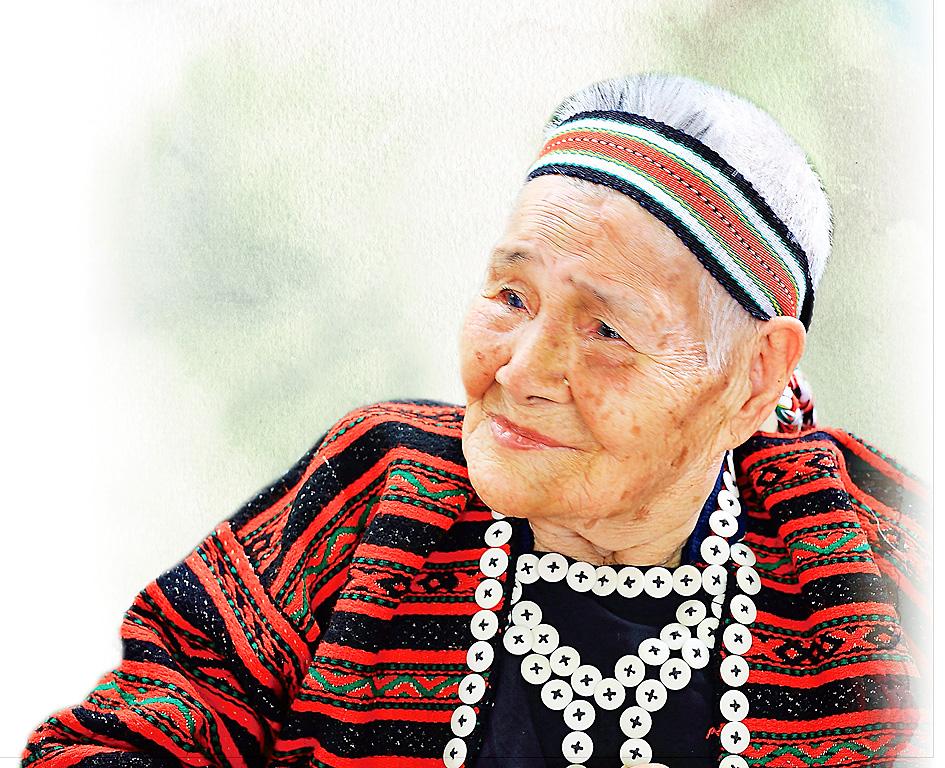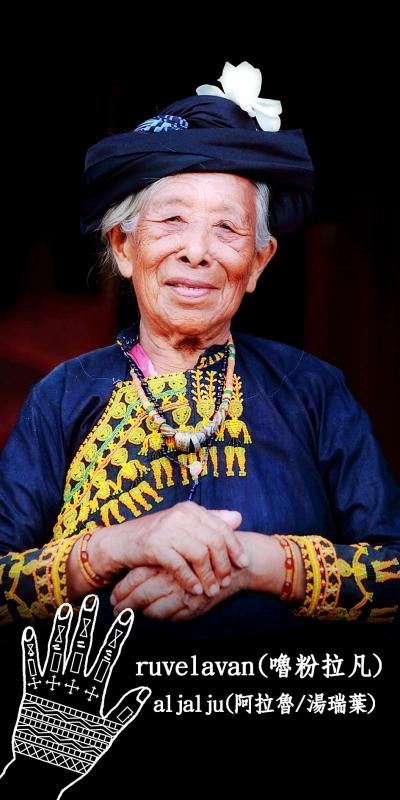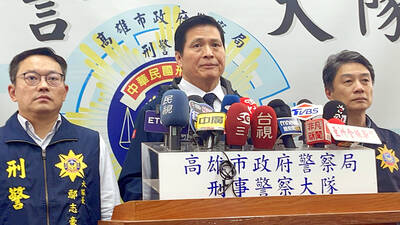Ipay Wilang, the last surviving government-designated preserver of traditional indigenous facial tattoos, passed away on Saturday.
She died at her home in Hualien County, said Kimi Sibal, a Hualien-based historian who cowrote a 2016 book on Taiwan’s then six remaining indigenous facial tattoo preservers.
Ipay Wilang, a Sediq, had returned to Hualien earlier on Saturday after being discharged from a hospital in New Taipei City, said Lo Mei-ching (羅美菁), head of the New Taipei City Indigenous Peoples Department.

Photo provided by the Ministry of Culture
She had been living with her eldest daughter in New Taipei City and was taken to Tucheng Hospital on Friday after she became unwell after catching a cold, Taiwan Indigenous TV reported.
Although her registered birthday was April 1, 1922, Lo said Ipay Wilang was actually 106 years old, because people at the time registered newborns some time after birth.
Council of Indigenous Peoples Minister Icyang Parod said the passing of Ipay Wilang meant that people can now learn about facial tattoo culture only from historic records.

Photo provided by Chen Wen-shan, chief of Nanhe Village in Pingtung County Laiyi Township
He thanked Kimi Sibal, who has been documenting the practices and taken photographs of more than 300 individuals across Taiwan who have the indigenous facial tattoos, and said his council would introduce indigenous culture to more people.
Minister of Culture Lee Yung-te (李永得), whose ministry published the book cowritten by Kimi Sibal, said in a statement that only Atayal, Seediq, Truku and Saisiyat people maintained the tradition of facial tattoos, which is a historically important part of Taiwan’s cultural heritage.
Lee said his ministry would seek a presidential citation to honor the life of Ipay Wilang.
The Hualien County Government in 2009 listed the traditional facial tattoo practices of Atayal, Sediq and Truku as cultural heritage, and named Ipay Wilang as a preserver of the art form in 2016, Lo said.
In the three communities, men can have facial tattoos on their forehead and jaw, and women on their forehead and cheeks when they were deemed capable of starting a family of their own, said Kimi Sibal, who has documented the practices for over two decades.
People with facial tattoos are believed to be able to join their ancestors in the afterlife, he added.
The practice was banned during Japanese colonial rule between 1895 and 1945, and Ipay Wilang was forced to remove her facial tattoo when she was 15, leaving scars on her face, Kimi Sibal said.
Separately, the Council of Indigenous Peoples on Saturday said that Aljalju rulelavan, one of the few preservers of the Paiwan women’s hand tattoo tradition, has passed away at the age of 93.
Aljalju died on Monday last week in Pingtung County’s Laiyi Township (來義), the council said.
Council Deputy Minister Calivat Gadu, a Paiwan, visited the township on Saturday to pay his respects and posthumously bestow on Aljalju the Third Class Award for Contribution to Indigenous Peoples, in recognition of her status as a preserver, the council said.
Aljalju was one of seven remaining culture conservationists in the township, who were certified last year by the Pingtung County Government in recognition of their preservation of veci’nua lima, the traditional hand tattoos of Paiwan women.
Traditionally, with the approval of the entire village, a woman may seek the village chief’s permission to obtain the tattoos, which reflect her social and familial status in the Paiwan culture, the council said.

Twenty-four Republican members of the US House of Representatives yesterday introduced a concurrent resolution calling on the US government to abolish the “one China” policy and restore formal diplomatic relations with Taiwan. Led by US representatives Tom Tiffany and Scott Perry, the resolution calls for not only re-establishing formal relations, but also urges the US Trade Representative to negotiate a free-trade agreement (FTA) with Taiwan and for US officials to advocate for Taiwan’s full membership in the UN and other international organizations. In a news release announcing the resolution, Tiffany, who represents a Wisconsin district, called the “one China” policy “outdated, counterproductive

Actress Barbie Hsu (徐熙媛) has “returned home” to Taiwan, and there are no plans to hold a funeral for the TV star who died in Japan from influenza- induced pneumonia, her family said in a statement Wednesday night. The statement was released after local media outlets reported that Barbie Hsu’s ashes were brought back Taiwan on board a private jet, which arrived at Taipei Songshan Airport around 3 p.m. on Wednesday. To the reporters waiting at the airport, the statement issued by the family read “(we) appreciate friends working in the media for waiting in the cold weather.” “She has safely returned home.

ON PAROLE: The 73-year-old suspect has a criminal record of rape committed when he was serving in the military, as well as robbery and theft, police said The Kaohsiung District Court yesterday approved the detention of a 73-year-old man for allegedly murdering three women. The suspect, surnamed Chang (張), was arrested on Wednesday evening in connection with the death of a 71-year-old woman surnamed Chao (趙). The Kaohsiung City Police Department yesterday also unveiled the identities of two other possible victims in the serial killing case, a 75-year-old woman surnamed Huang (黃), the suspect’s sister-in-law, and a 75-year-old woman surnamed Chang (張), who is not related to the suspect. The case came to light when Chao disappeared after taking the suspect back to his residence on Sunday. Police, upon reviewing CCTV

TRUMP ERA: The change has sparked speculation on whether it was related to the new US president’s plan to dismiss more than 1,000 Joe Biden-era appointees The US government has declined to comment on a post that indicated the departure of Laura Rosenberger as chair of the American Institute in Taiwan (AIT). Neither the US Department of State nor the AIT has responded to the Central News Agency’s questions on the matter, after Rosenberger was listed as a former chair on the AIT’s official Web site, with her tenure marked as 2023 to this year. US officials have said previously that they usually do not comment on personnel changes within the government. Rosenberger was appointed head of the AIT in 2023, during the administration of former US president Joe